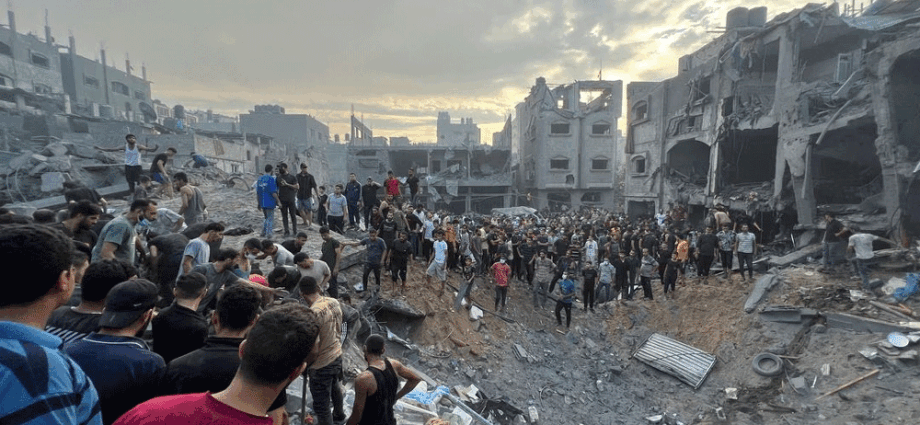ME: Daily life has become “apocalyptic” in parts of southern Gaza since Israel moved into the city of Rafah, though the situation in the north is improving, the UN’s food agency said Friday.
“The recent mass exodus from Rafah has been a terrifying and devastating experience for many individuals,” said Matthew Hollingworth, the director of the World Food Programme (WFP) in the Palestinian territories. As people fled the violence, they found themselves in areas lacking essential resources such as water, healthcare, and fuel. Food was scarce, communication was cut off, and there was a lack of sanitation facilities.
Hollingworth described the public health situation as a crisis, with everyday life becoming unbearable. The WFP was able to provide diminishing amounts of assistance, as their bakeries in Rafah had to close due to a lack of supplies. Additionally, the WFP lost access to its main warehouse in the Gaza Strip, resulting in a significant amount of food being looted or destroyed. Although the WFP was providing hot meals to a portion of the population, the need was far more significant.
The situation was slightly better in other parts of Gaza, with the WFP serving 400,000 hot meals daily and maintaining functioning bakeries. However, many people struggled financially and resorted to trading their identity cards for aid. Aid trucks from Egypt had started entering Gaza, but the security situation was hindering deliveries. Hollingworth emphasized the urgency of increasing assistance to prevent severe hunger from becoming more widespread.
In the northern part of Gaza, the situation had improved slightly, with the opening of crossings allowing for the delivery of 12,000 metric tons of interagency assistance since May 1. However, issues with healthcare, clean water supply, and sewage remained. The United States had constructed a temporary pier in Gaza, but it was damaged, temporarily halting deliveries.
Despite Israeli Prime Minister Benjamin Netanyahu’s claims that his government was working to avoid famine in Gaza, Hollingworth disputed this, stating that he had not seen anyone, including aid workers, consuming the recommended calorie intake in Gaza. Hamas’s attack on southern Israel, which resulted in the deaths of numerous civilians, sparked the Gaza war. Israel’s retaliatory offensive had caused a significant number of casualties in Gaza.
“The exodus that we’ve seen in the past 20 days or so out of Rafah has been an awesome and horrific experience for many, many people,” said Matthew Hollingworth, the World Food Programme (WFP) director for the Palestinian territories.
They have fled the fighting to areas where there is not enough water, healthcare, or fuel, food is limited, telecommunications have stopped, and there is not enough space to dig pit latrines, Hollingworth told an online briefing.
US tells UN: Israel undermines goals with civilian harm in Gaza
Source link
2024-06-01 10:23:48
World
Gaza conflict,Gaza genocide,Gaza war,Gaza Strip,Palestinians,Gaza,MENA,Palestine










